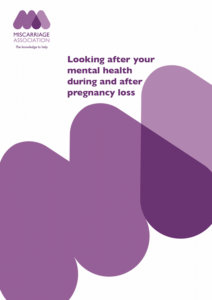Your mental health
We all need to look after our mental health. Pregnancy loss may mean you need to take even greater care of yourself for a while.
Pregnancy loss and mental health problems
You may have experienced a loss recently. Or perhaps your loss or losses were a while ago but you feel as bad, or worse than ever. You may have experienced the physical loss yourself, or you may be the partner of someone who has.
Whatever your situation, if you need some more support with your mental health, this information is for you.
Your feelings
 How you feel after your loss will depend on your circumstances, your experience of loss and what the pregnancy meant to you. Read Sian’s description of the impact of miscarriage on her mental health.
How you feel after your loss will depend on your circumstances, your experience of loss and what the pregnancy meant to you. Read Sian’s description of the impact of miscarriage on her mental health.
- How pregnancy loss could contribute to mental health problems.
- Diagnoses and symptoms linked to pregnancy loss.
- Finding your way through.
You might also find it helpful to have a look at these pages.
Do you need urgent help?
If you are looking at this information because you are feeling suicidal right now, here are some options for you.
- Go to your local A&E department or call 999.
- Contact the Samaritans anytime on freephone 116 123.
- Contact your GP for an emergency appointment or to speak to the out of hours team.
- Look at Mind’s ‘I need urgent help’ tool.
How pregnancy loss could contribute to mental health problems
For some people, pregnancy loss may be part of what causes a mental health problem – or makes one worse. You might be given a diagnosis (like post-traumatic stress disorder) or experience symptoms that make life difficult for a long time.
When there was no joy in my life months after my loss, when I stopped caring about myself and started to believe the world was better off without me, I knew that was more than grieving.
Sometimes the trauma of your loss may cause intrusive thoughts, flashbacks or nightmares. Sometimes it’s what happens afterwards that contributes to mental health problems. Lots of people experience a combination of these things.
Thinking lots of negative thoughts about yourself
Negative thoughts about yourself can lead to low self-esteem. Having low self-esteem can be linked to mental health problems. It can also make it harder to ask for help.
Angela stopped believing in herself and lost a lot of confidence. Read her story here.
Below are some of the negative thoughts that people told us they experienced.
- I ‘should’ be coping better.
- I ‘should’ be stronger or be able to offer more support to my partner.
- It was my fault.
- There’s something wrong with me.
- I have let people down.
I have always struggled with low self-esteem. The losses really exacerbated this as I felt it was all my fault. I felt useless as a woman.
Thinking and worrying a lot
Worrying a lot is exhausting. It can create negative thought patterns and change how you behave. It may also make it harder to focus on things that could help you feel better.
For example, you might be:
- wondering whether you could have prevented the loss,
- pregnant again, reading all online advice about avoiding miscarriage,
- worrying about conceiving or about whether you will ever have children,
- feeling as if you don’t have as much control over your life as you would like,
Feeling lonely and isolated
Loneliness and isolation can have a negative impact on your mental health. Pregnancy loss can make you feel alone in different ways.
Feeling physically isolated. You may feel unable to go out or see friends or family because it’s too difficult to see pregnant women or children. But this might mean you miss out on valuable sources of comfort and support. During the coronavirus pandemic, those feelings of isolation might have been even more acute, and it may be that they are still affecting you.
Feeling as if no one understands you. You might have lots of people around you but none of them seem to understand how you feel or care for you in the way you would like. It may feel particularly difficult if you don’t think your partner understands you.
Jess didn’t want to talk to anyone about her feelings after her loss. Read her story here.
Having an existing mental health problem
If you live with a mental health problem already, you may find that pregnancy loss adds extra strain and makes it harder to cope.
The losses have made my anxiety (which was mild before), more difficult to deal with. I’ve started worrying more about losing people close to me such as my husband. I’m terrified of going through another miscarriage.
Turning back to coping behaviours you have used in the past
If you have used coping behaviours like food (restricting or eating more), exercise, self-harm, alcohol or drugs in the past, you may turn back to these after your loss. Although they may help in the short term, relying on them may mean you don’t seek long-term support or find more helpful ways to cope.
Diagnoses, symptoms and experiences
Although more research is needed, pregnancy loss has been linked to anxiety disorders, depression and post-traumatic stress in those who experience the physical loss and in their partners. You can read more here about one study published in January 2020.
Not everyone is diagnosed with a specific mental health problem. But you might still have symptoms that are upsetting and difficult to live with. If you experience any of these, you may want to look for some extra support.
- Flashbacks– feeling as if you are re-experiencing your loss (as if it is happening right now).
- Panic attacks – you may feel sweaty, sick, disconnected, shaky and out of control. Hayley wrote about her experience of panic attacks after her loss.
- Self-harm – hurting yourself to help deal with overwhelming emotions and painful thoughts.
- Suicidal feelings – thinking the world would be better off without you, having more abstract thoughts about death, or making a plan to end your life.
- Insomnia or problems with sleep – finding yourself unable to sleep because you are worrying and thinking a lot about your loss – or for another reason.
- Nightmares – having nightmares related to your loss when you do sleep.
- Feeling tired all the time – even if you have managed to get enough sleep.
- Intrusive thoughts – not being able to control when images or thoughts related to your loss appear in your mind..
- Difficulty concentrating or remembering things.
- Phobias – feeling very scared or anxious about something specific, perhaps related to your loss (but not always).
You can read more about these diagnoses, symptoms and experiences at mind.org.uk.
I have a constant terror of periods (blood in vagina area) and of doctors.
Finding your way through
Finding your way through the experience of pregnancy loss and recovering from a mental health problem can be a long journey.
You may find you never go back to how your life was before. Instead, you’ll find a new normal. This might include learning more about your strengths and your vulnerabilities and building a ‘toolkit’ of coping mechanisms.
It may not be a straightforward process but being kind to yourself, talking to people you trust and finding the right help can make a big difference. If you are finding it difficult to move forward, we can help you think through your next steps.
Take one day at a time. It’s okay to have these feelings of grief, anger, resentment, sadness and so much more. They won’t always feel this strong.
For more information about the research we undertook to develop our mental health resources, download our report, ‘Pregnancy loss, Mental Health and the NHS‘.

